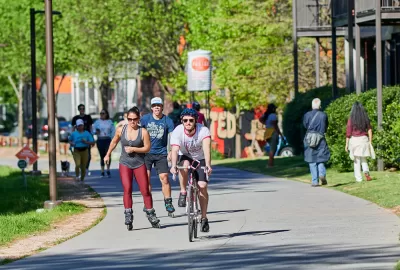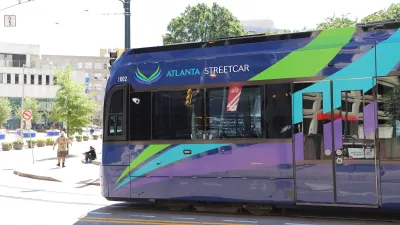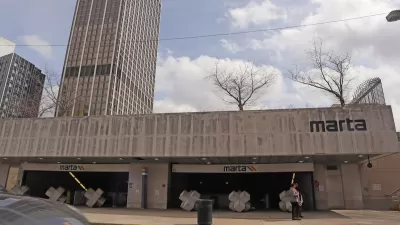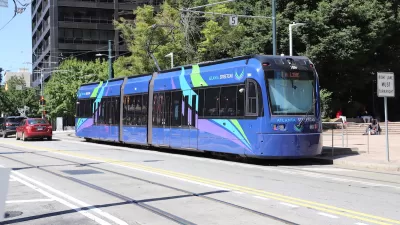Supporters of a proposed streetcar extension argue that Atlanta’s popular BeltLine corridor was always meant to include transit, making it more than just a recreational area.

More than two decades ago, an idea to repurpose an Atlanta rail corridor into a multi-use path, complete with a light rail line, was born at Georgia Tech. Now, a professor from that institution drew criticism from light rail supporters for a provocative op-ed calling the proposal to extend the Atlanta Streetcar to the BeltLine “a train wreck.” Writing in Urbanize Atlanta, Josh Green quotes portions of Professor Hans Klein’s editorial, countering them with responses from BeltLine Rail Now! (BRN), a group that supports the project.
In the op-ed, Klein writes, “Less-costly transit technologies and more useful radial routes are the basis of successful transit.” BRN’s response: “The BeltLine is the only place with existing dedicated space for transit to move unimpeded by cars, in its own right of way, and it would be a folly to not take advantage of that.”
Klein proposes that bus rapid transit (BRT), which MARTA is building elsewhere in Atlanta, “can provide all the functionality of light rail at a much lower cost and with nearer-term deployment.” BRN, meanwhile, argues that streetcars can serve more users thanks to their larger capacity, meaning a need for fewer trains that will disrupt pedestrian traffic at crossings. According to BRN, “The BeltLine is meant to be much more than a walking and biking trail. It has always been planned as a transit corridor.” Removing a transit option, BRN says, is an “ableist” move that would limit mobility for people unable to walk, bike, or scooter for long distances.
FULL STORY: Georgia Tech professor slams BeltLine rail idea; supporters fire back

Alabama: Trump Terminates Settlements for Black Communities Harmed By Raw Sewage
Trump deemed the landmark civil rights agreement “illegal DEI and environmental justice policy.”

Study: Maui’s Plan to Convert Vacation Rentals to Long-Term Housing Could Cause Nearly $1 Billion Economic Loss
The plan would reduce visitor accommodation by 25% resulting in 1,900 jobs lost.

Planetizen Federal Action Tracker
A weekly monitor of how Trump’s orders and actions are impacting planners and planning in America.

Waymo Gets Permission to Map SF’s Market Street
If allowed to operate on the traffic-restricted street, Waymo’s autonomous taxis would have a leg up over ride-hailing competitors — and counter the city’s efforts to grow bike and pedestrian on the thoroughfare.

Parklet Symposium Highlights the Success of Shared Spaces
Parklets got a boost during the Covid-19 pandemic, when the concept was translated to outdoor dining programs that offered restaurants a lifeline during the shutdown.

Federal Homelessness Agency Places Entire Staff on Leave
The U.S. Interagency Council on Homelessness is the only federal agency dedicated to preventing and ending homelessness.
Urban Design for Planners 1: Software Tools
This six-course series explores essential urban design concepts using open source software and equips planners with the tools they need to participate fully in the urban design process.
Planning for Universal Design
Learn the tools for implementing Universal Design in planning regulations.
Caltrans
Smith Gee Studio
Institute for Housing and Urban Development Studies (IHS)
City of Grandview
Harvard GSD Executive Education
Toledo-Lucas County Plan Commissions
Salt Lake City
NYU Wagner Graduate School of Public Service





























